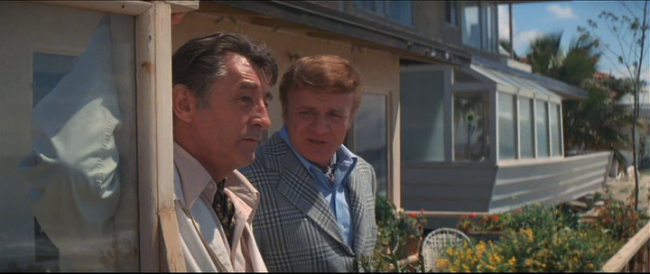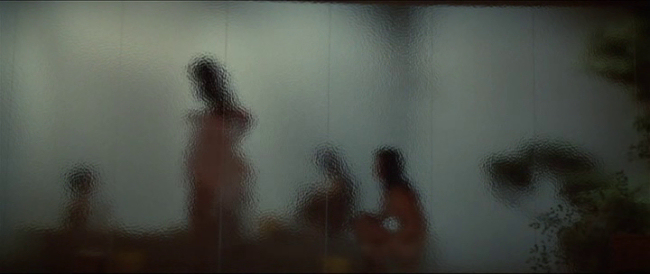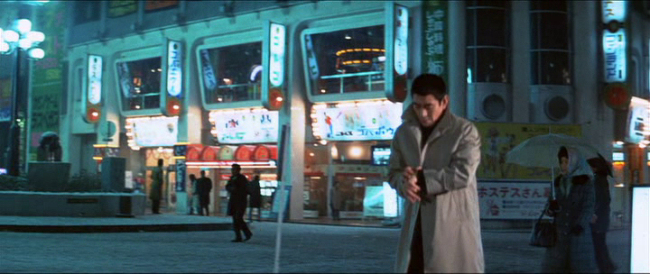
There's a movie starring Robert Mitchum with a screenplay by Paul Schrader and Robert Towne--that's the screenwriters of Taxi Driver and Chinatown, respectively. It's set in Japan and was mostly shot in Japan. Seductive pedigree, isn't it? Well, 1974's The Yakuza is a good movie, owing much more to American story traditions than Japanese despite the fact that it employed two prominent Japanese actors--Ken Takakura and Keiko Kishi. It's like a good Western, the story of exiled gunfighters who come to town to honour debts, who bond in ways where women can't play a part. It's American men's romance, the story belonging to an era of cinema twenty years older. The primary flaw of the film is its director, Sydney Pollack, who doesn't seem to have had a real feel for this kind of story. In the hands of maybe Sam Peckinpah or Sergio Leone this could have been a great film. As it is, it's not bad.

Harry Kilmer (Mitchum) leads a relaxed if apparently lonely life taking care of his garden in L.A. when his friend, George Tanner (Brian Keith), comes to him for help. It seems Tanner has failed to make good on an arms deal with a Yakuza clan and now he's in trouble. There's one way Kilmer can help that the cops can't--we're not told right away what it is. They fly on separately planes to Tokyo.

One of the film's problems manifests when we do get the story, a long, dry exposition by Oliver (Herb Edelman), an American who lives in Tokyo in whose home Kilmer stays while in town. Oliver explains to Dusty (Richard Jordan)--Tanner's young bodyguard sent to accompany Kilmer--and to us during a montage of Mitchum walking Tokyo's streets that, after World War II, Kilmer, Tanner, and Oliver had been part of the U.S. occupying force in Japan. Kilmer had fallen in love with a girl named Eiko (Kishi) but when Eiko's brother, Ken (Takakura), a soldier and now yakuza, emerged from hiding to find the war was over and the Americans won, was shocked to find he owed a debt of gratitude to an American for taking care of his sister. But he wouldn't approve of a marriage between Kilmer and Eiko.

All this is explained to us and it takes a lot of the wind out of the sails of Mitchum and Kishi's subsequent scene. All this stuff that could have been established through their dialogue instead leaves them with a few awkward lines of greeting and a wordless montage of the two of them laughing and getting along. There isn't much chemistry between the actors though I was very impressed by Mitchum's Japanese--he clearly studied the language a bit, at least proper pronunciation.

There's a lot more going on between Mitchum and Takakura, reminiscent of Joel McCrea and Randolph Scott in Ride the High Country, and their mutual respect and simmering rivalry evolve into a genuine friendship as they fight their way through a plot of double crosses and hidden motives. Mitchum generally wields guns while Takakura's character, a kendo master, wields swords. Most of the action scenes aren't impressive, the sword stuff in particular drawing on compositions that were already pretty well worn in Japan. I recognised some from the exploitation film, Sex & Fury, released two years earlier.

But there are some interesting visuals. There's a strange bath house Kilmer and Dusty go to with a fish tank in the middle and a glass partition so the men's and women's sides can see each other--there's something Kubrickian about the place.


I also love shots of 1970s Tokyo, a time and place that somehow to me seems rather rich in a kind of rough romance.

And Mitchum at the centre of the film is just as solid and possessed of that zen-like, melancholy anger that fuelled so many of his films of the 40s and 50s. It's rather a pleasure seeing him work so well in this context.

No comments:
Post a Comment